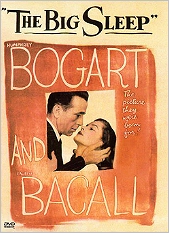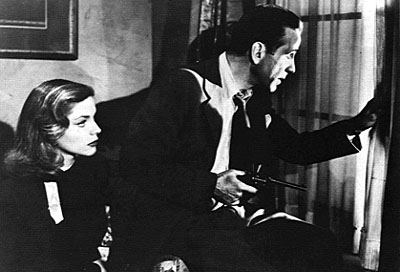Just after the close of World War II Faulkner worked on movies made from the famous detective novels of Raymond Chandler. One of the novels, The Big Sleep, was notoriously convoluted. In the movie, its almost incomprehensible plot was made even more difficult to follow by the absence of the hero as narrator; the whole complex mess had to be revealed to the viewer by dialogue. Worse yet, the producers decided to edit out a scene in which Chandler's detective, Philip Marlowe, runs down what's known about the case with a police inspector somewhere near the midpoint of the plot.
This situation generated the anecdote I missed seeing in the TinL article:
The most famous loose end in the story concerns a chauffeur, one Owen Taylor, who turns up dead in a water-logged Packard, "washing around off Lido Pier." Questions on the set arose as to who, in the carnival of conflicting motives that made the film a Chinese box of mayhem, actually did kill Owen Taylor? Hawks realized he didn't know, and successive calls were put in to screenwriters Leigh Brackett, Jules Furthman, and William Faulkner; they didn't know, either. Finally, Chandler himself was reached; no, he said, he guessed he didn't know, either. Editor Christian Nyby remembered years later that work on the film stopped for two days while a way out of this narrative cul-de-sac was sought. At that point, Hawks realized it didn't matter who killed Owen Taylor, and the film went ahead, its atmosphere of treachery somehow improved by the ambiguity.
There is a ton of good sites on "The Big Sleep," Chandler, and Faulkner in Hollywood. One, a blog by Bernard Schopen, I particularly recommend for bits of dialogue. Some of these bits are with an 18-year-old bombshell named Lauren Bacall, whom Humphrey Bogart, the actor playing the hero, would soon marry, but this one is with the other lead actress. Here's how Schopen presents it:
Behind the credits, a silhouetted couple light cigarettes, and then leave them burning in an ashtray. In the opening sequence, an unidentified hand and finger press in the doorbell buzzer of a mansion doorway. A hard-boiled, laconic, intelligent, and cynical private detective Philip Marlowe (Humphrey Bogart) arrives at a lavish mansion. [Bogart played the part of Marlowe only once.] The Los Angeles gumshoe is there to consult with wealthy, aging and dying, dessicated, wheelchair-bound "General" Sternwood (Charles Waldron), a rich widower:Bogey's most famous line in the film comes a bit later in his first scene with Bacall:
My name's Marlowe. General Sternwood wanted to see me.
On the way in, he meets one of the General's two alluring and sexy daughters, the younger, troubled, errant, thumb-biting, frequently doped-up nymphomaniacal heiress Carmen (Martha Vickers), wearing a white polka-dot miniskirt. He notices her legs after she descends the stairs. Capriciously, she tells him:
Carmen: You're not very tall, are you?
Marlowe: Well, I, uh, I try to be.
Carmen: Not bad looking. Oh you probably know it. (while twirling and biting a lock of her hair)
Marlowe: Thank you.
Carmen: What's your name?
Marlowe: Reilly. Doghouse Reilly.
Carmen: That's a funny kind of name.
Marlowe: You think so.
Carmen: Uh, uh. What are you? A prizefighter?
Marlowe: No, I'm a shamus.
Carmen: What's a shamus?
Marlowe: It's a private detective.
Carmen: You're making fun of me.
Marlowe: Uh, uh.
Carmen (she leans back and falls into his arms, throwing herself at him): You're cute.
Vivian: You know, I don't see what there is to be cagey about, Mr. Marlowe. And I don't like your manners.Kuusankosken kaupunginkirjasto, from Finland, has the best web page on Raymond Chandler. I leave it to you to find other pages on Faulkner, Chandler, Bacall and Bogart, and the rest.
Marlowe: I'm not crazy about yours. I didn't ask to see you. I don't mind if you don't like my manners. I don't like them myself. They're pretty bad. I grieve over them long winter evenings. And I don't mind your ritzing me, or drinking your lunch out of a bottle, but don't waste your time trying to cross-examine me.
Some publicity stills from various sites, including Bernard Schopen's blog. These are from "The Big Sleep":








This is from the most famous scene in "To Have and Have Not;" it's unforgettable:

A couple of Faulkner shots from the brightlightsfilm site:






No comments:
Post a Comment